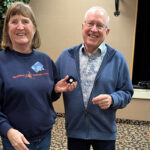Home »

Wildlife conflicts anticipated soon
As the end of summer approaches, your wildlife ‘spidey-senses’ should be tingling.
Historically, the months between late August and early November are the most active for wildlife conflict in the Columbia Valley.
A good spring moisture supply followed by warm temperatures and lots of sun meant berry crops, wildflowers, and grasses were abundant at high elevations early this summer. Now that we have been experiencing extended dry days, and are approaching the cusp of berry season, we can expect to see wildlife coming down from higher elevation areas in search of food.
The adage “a fed bear is a dead bear” holds very true – and it’s not just about bears. Food conditioning and human habituation can cause unnecessary conflict between humans and ungulates, carnivores and omnivores. Once a wild animal has received a food reward, it is very difficult to convince it not to return for more rewards in the future. Bears in particular will go to extremes of breaking into cars, climbing balconies, and entering homes and businesses in search of food.
When a wild animal displays aggressive behaviour toward humans, the animal is usually removed from the population for public safety reasons. This is no fault of the animal – very often, the situation that led to the unwanted behaviour began with a simple, and often unintentional, feeding by humans. Food conditioned animals, such as bears, cannot always be simply relocated; studies have shown that this is often not a viable option.
To ensure your property is as free as possible from food sources over the next couple of months:
Ensure garbage is stored in a tight container, and secured inside a garage or basement.
Pick berries and fruits before they ripen, and clear the ground of windfall fruits.
Remove discarded bird seed, and ensure feeders are stored away until winter.
Manage compost to reduce odours.
Feed pets indoors, or take food bowls in as soon as they finish eating.
By reducing the potential for wild animals to be attracted to food sources on your property, you are helping ensure that our local wildlife stays wild and our communities stay safe.
For more information about preventing human-wildlife conflict, please visit: www.wildsafebc.com.
To report wildlife conflict issues, please dial the RAPP line at: 1-877-952-7277.
WildSafeBC is a provincial wildlife safety education program. The Columbia Valley program appreciates the financial support of The Province of BC, Columbia Basin Trust, the Village of Radium Hot Springs, the District of Invermere, and RDEK Areas F & G.
– Thea Rodgers is WildSafeBC Community Coordinator for Radium Hot Springs and RDEK Area F & G








